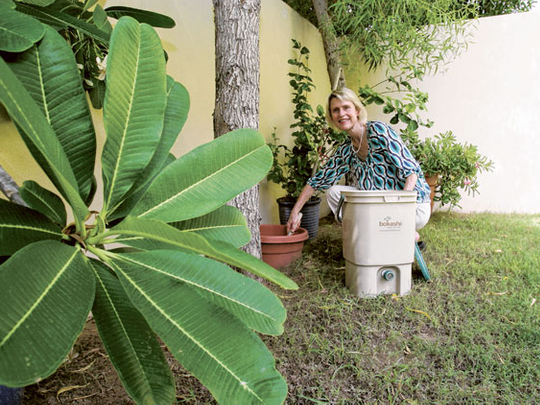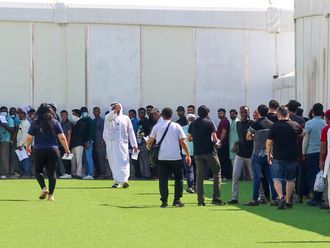
Dubai: Springs resident Janine Sheard from South Africa has two years worth of food scraps and peels spread around her garden which fertilises it without using any chemicals.
After each meal she places any vegetable or fruit peels and food scraps into an easy to use food composting system placed under the kitchen table. Three weeks later she can use it as nutritious humus added to her sandy garden soil.
The secret ingredient is Bokashi. Originating from Japan, Bokashi is a special formula made up of wheat bran, rice bran, molasses and probiotics that breaks down food by pickling it, before it can rot and give off a smell. "There are no chemicals so I know I'm not polluting the ground water. My neighbours' trees are starting to look much better as well and I'm sure it's from Bokashi, although they wouldn't know it," said Sheard, distributor of Bokashi in the UAE for the last two years.
Since adopting Bokashi, her weekly household waste has dropped to just one bag every 10 to 15 days. After segregating her recyclable materials and composting her food waste, there is barely anything to put in her bin.
Waste food
According to Dubai Municipality the amount of food and scraps thrown away during Ramadan increases by up to 20 percent every year. Finding a solution for organic waste has become vital.
"There is a question about what to do with food scraps. Organic waste in landfills takes up space and produces methane and other dangerous gases. Composting it avoids all that," said Sheard. During Ramadan 2010 around 1,850 tonnes of food was thrown out on average per day in Dubai. In Abu Dhabi at least 500 tonnes of food was thrown out on a daily basis during the month.
After each layer of discarded food, a layer of Bokashi granules is thrown on top. Once the bin is full the contents have to be mixed with actual soil and left for three to four weeks in order for the food waste to degrade fully.
"Compost is not created in the bin, it has to be placed in a small hole in the garden, or mixed with soil in a pot in an apartment. It's a very simple process, it just requires a system," said Sheard.
Bokashi user Cheryl Warren, a Springs resident from the UK, has been growing herbs and tomatoes, lime and lemons as well as more exotic fruits like pineapple with her home-made compost "It has changed my lifestyle. I have stopped throwing food waste in the bin I didn't want to throw away anyway," said Warren.
"You can't have a regular compost heap because it gets too hot, and would attract rats. I grow thing in the winter and prepare the soil in the summer."
Jumeirah hotel recycles raw waste
In autumn 2010, Madinat Jumeirah became the first hotel to implement a Bokashi system producing organic compost which is now used in the resort's gardens to enrich the soil and improve its water-holding qualities.
A pilot project was first started in the gardens of Al Qasr hotel.
On average 2.1 tonnes of raw food waste is recycled each month at Al Qasr and this compost is also used to fertilise the hotel's own organic herb garden.












